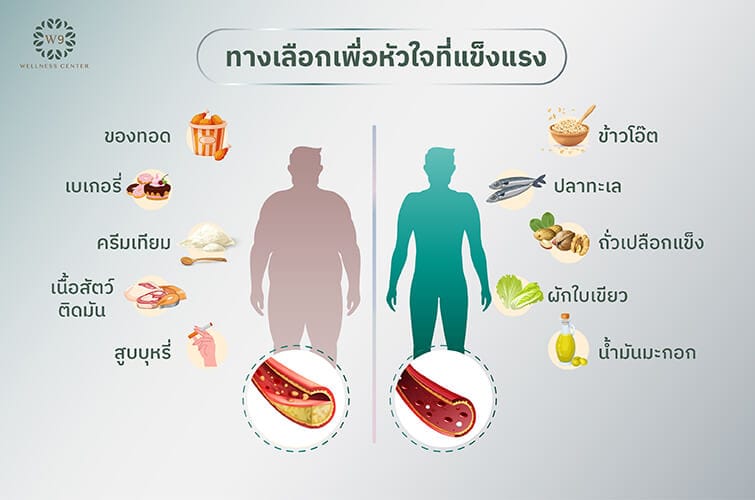
High blood fat (High Cholesterol) is one of the chronic health problems that are commonly found in Thai people, especially in the working age group who live a fast-paced life and have behaviors thatEating a high-fat diet, lack of exercise, and accumulated stress These are all risk factors that can increase blood fat levels without you knowing it.
According to the data ofDepartment of Disease Control Stroke is the second leading cause of death among Thais and is also one of the leading causes of premature death, with most deaths occurring before the age of 70.
Data from the Ministry of Public Health's Health Database Reporting System (HDC) in 2024 found that:
One of the most important risk factors is “high blood fat”, which most people are unaware of because there are no obvious symptoms until severe complications occur, such as blocked coronary arteries or cerebral infarction.
Blood Lipids are a group of fats that circulate in the bloodstream. They act as a source of energy, provide warmth, and play a role in growth, brain function, and the body's metabolic system.
Some of the fat in the blood can be created by the body itself, while the other part comes from the food we eat, especially fatty meats, butter, trans fats, and foods that are very sweet, oily, or salty. If your blood fat levels are too high or too low, it can increase your risk of heart disease and blood vessels. and other chronic diseases
| Test results | Normal value | Danger level |
| Cholesterol or Total Cholesterol | <200 mg/dL | Higher value 240 mg/dL |
| Triglyceride (TG) | <150 mg/dL | Higher value 200 mg/dL |
| HDL – Cholesterol | man : 40-50 mg/dL woman : 50-59 mg/dL | Below standard Specified |
| LDL – Cholesterol | <100 mg/dL | Higher value 130 mg/dL |
Many people wonder that “Is 250 cholesterol dangerous?” The answer is "yes" Especially if it is LDL fat that is higher than 160 mg/dL because it will increase the risk of coronary heart disease, cerebral infarction and hardening of the arteries, which are the leading causes of death among Thais.
In some cases, even if the lipid levels do not appear to be very high, if there are genetic risk factors or a high Lipoprotein(a) level, treatment may be required.Deep blood lipid screening To see the size and number of fat particles, it will help to assess the risk more accurately.
What many people often misunderstand is “You have to have symptoms before you know.” But the truth is High blood fat often does not cause any symptoms in the early stages. Before long, I realized that I had acute myocardial infarction or a stroke.
But in some cases, small signs may be noticed, such as:
Annual blood tests are the best way to monitor and prevent.
If behavioral changes do not reduce cholesterol levels, the doctor may consider using Statins to control cholesterol levels, especially in those at high risk, such as those with diabetes, high blood pressure, or heart disease, such as:
Therefore, useCholesterol-lowering drugs cannot be used in the same way for everyone. Because of the quantity and necessity inThe use of medication will depend on each person's health and the assessment from the doctor.Whether or not to use it and what is the most appropriate dosage?
Foods that help reduce blood fat
Foods to avoid

Although high blood fat may seem asymptomatic, if left untreated, it can unexpectedly lead to serious illnesses. The best solution is:
If you are concerned about your blood lipid levels or have had them checked and found they are high but are not sure how dangerous they are, we recommend that you consult an anti-aging medicine specialist at W9 Wellness Center for an in-depth health assessment and safe, personalized care.
Praram 9 Hospital (3rd floor, Building A)
Anti-aging and preventative medicine physician
W9 Wellness Center
Do you know what Vitamin D has to do with immunity? Vitamin D helps create and control the function of all types of white blood cells.
Dementia or Alzheimer's is a condition in which brain function is impaired.